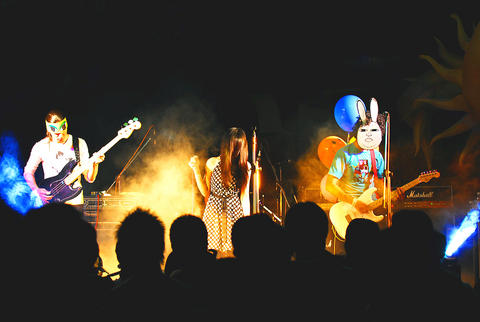On Wednesday night at The Queens, a plush, LED-festooned club on the 12th floor of the Core Pacific (京華城) mall that hosts live bands every night of the week, a group of more than 40 people gathered for what looked like a corporate party. Most of them were in their late thirties or older, and the men were wearing jackets and ties - not the kind of audience you'd expect to turn up for a show by Rabbit Is Rich (兔子很有錢), a raw, New York-style garage-rock band influenced by The Strokes, The Hives and The Yeah Yeah Yeahs. But several songs into the set, as the group's petite singer Andrea Huang (黃盈誼) screeched, yelped and strutted around in a black mini-dress with a glittering silver-studded belt, nearly everyone was on the dance floor, bobbing like pogo sticks and flailing their hands in the air as she sang, "I'm gonna, gonna, gonnna kick your ass. I'm gonna, gonna, gonnna kick your ass."
Arriving on the Taipei pub circuit last year with a gloriously blunt sound that distills powerful grunge chords through short and simple songs, Rabbit Is Rich is an echo of the garage-band revival that swept the West around the turn of the century. Guitarist and band founder Ethan Fang (方奕勝), bass player Adam Kuo (郭漢威) and drummer Roxy Lin (林志軒) rip off a bristling wall of sound with brittle guitar riffs, spiky bass lines and bouncing beats to frame Huang's exuberantly aggressive singing and freak-rock prancing and hair-shaking. The result is one of the most electrifying bands to come out of the college rock scene in recent years.
"They have energy," said The Queen's manager, who gave his name as Cool Jay (小傑). Speaking outside the club after Rabbit Is Rich's set, while a band of 50-year-olds covered classic-rock hits, he said he booked the foursome after seeing them play earlier this month at The Wall (這牆). "I like grunge, but now few bands do grunge. It's all punk."

PHOTO: COURTESY OF RABBIT IS RICH
Rabbit Is Rich takes its name from the title of a John Updike novel. No one in the band has read the book; they just wanted a sentence for a name and thought this one sounded funny. The band's lyrics, written in English by Huang, are equally straightforward. I'm Gonnna Kick Your Ass was inspired by an annoying person, Rabbit Is Rich by a dream Huang had in which she was followed around by an anthropomorphic rabbit, and What I Hear is a song about "how some people always lie," said Huang, which makes you feel "uh huh, uh huh." Band members are all college students, aged 21 to 22. Fang met Lin in junior high school, Kuo in high school and Huang in college. Their favorite gig so far was at last summer's Formoz rock festival (野台開唱), because, Fang said, he got to wear a furry rabbit mask (he also has one made out of cardboard). Their least favorite performance was earlier this year at Longshan Temple, when they played in front of a bunch of senior citizens who sat around eating fruit and wanted to hear traditional Taiwanese songs.
Band members say they hope to stay together after they graduate from college but didn't let on to having many loftier goals. "We hope to play overseas later," said Huang. "If we can make a living by this, that's good," said Lin. "But if we can't, we see it as our interest."
To listen to Rabbit Is Rich's music and find out about upcoming shows, visit www.myspace.com/rabbitisrichsound
- Ron Brownlow

May 11 to May 18 The original Taichung Railway Station was long thought to have been completely razed. Opening on May 15, 1905, the one-story wooden structure soon outgrew its purpose and was replaced in 1917 by a grandiose, Western-style station. During construction on the third-generation station in 2017, workers discovered the service pit for the original station’s locomotive depot. A year later, a small wooden building on site was determined by historians to be the first stationmaster’s office, built around 1908. With these findings, the Taichung Railway Station Cultural Park now boasts that it has

Wooden houses wedged between concrete, crumbling brick facades with roofs gaping to the sky, and tiled art deco buildings down narrow alleyways: Taichung Central District’s (中區) aging architecture reveals both the allure and reality of the old downtown. From Indigenous settlement to capital under Qing Dynasty rule through to Japanese colonization, Taichung’s Central District holds a long and layered history. The bygone beauty of its streets once earned it the nickname “Little Kyoto.” Since the late eighties, however, the shifting of economic and government centers westward signaled a gradual decline in the area’s evolving fortunes. With the regeneration of the once

In February of this year the Taipei Times reported on the visit of Lienchiang County Commissioner Wang Chung-ming (王忠銘) of the Chinese Nationalist Party (KMT) and a delegation to a lantern festival in Fuzhou’s Mawei District in Fujian Province. “Today, Mawei and Matsu jointly marked the lantern festival,” Wang was quoted as saying, adding that both sides “being of one people,” is a cause for joy. Wang was passing around a common claim of officials of the People’s Republic of China (PRC) and the PRC’s allies and supporters in Taiwan — KMT and the Taiwan People’s Party — and elsewhere: Taiwan and

Even by the standards of Ukraine’s International Legion, which comprises volunteers from over 55 countries, Han has an unusual backstory. Born in Taichung, he grew up in Costa Rica — then one of Taiwan’s diplomatic allies — where a relative worked for the embassy. After attending an American international high school in San Jose, Costa Rica’s capital, Han — who prefers to use only his given name for OPSEC (operations security) reasons — moved to the US in his teens. He attended Penn State University before returning to Taiwan to work in the semiconductor industry in Kaohsiung, where he